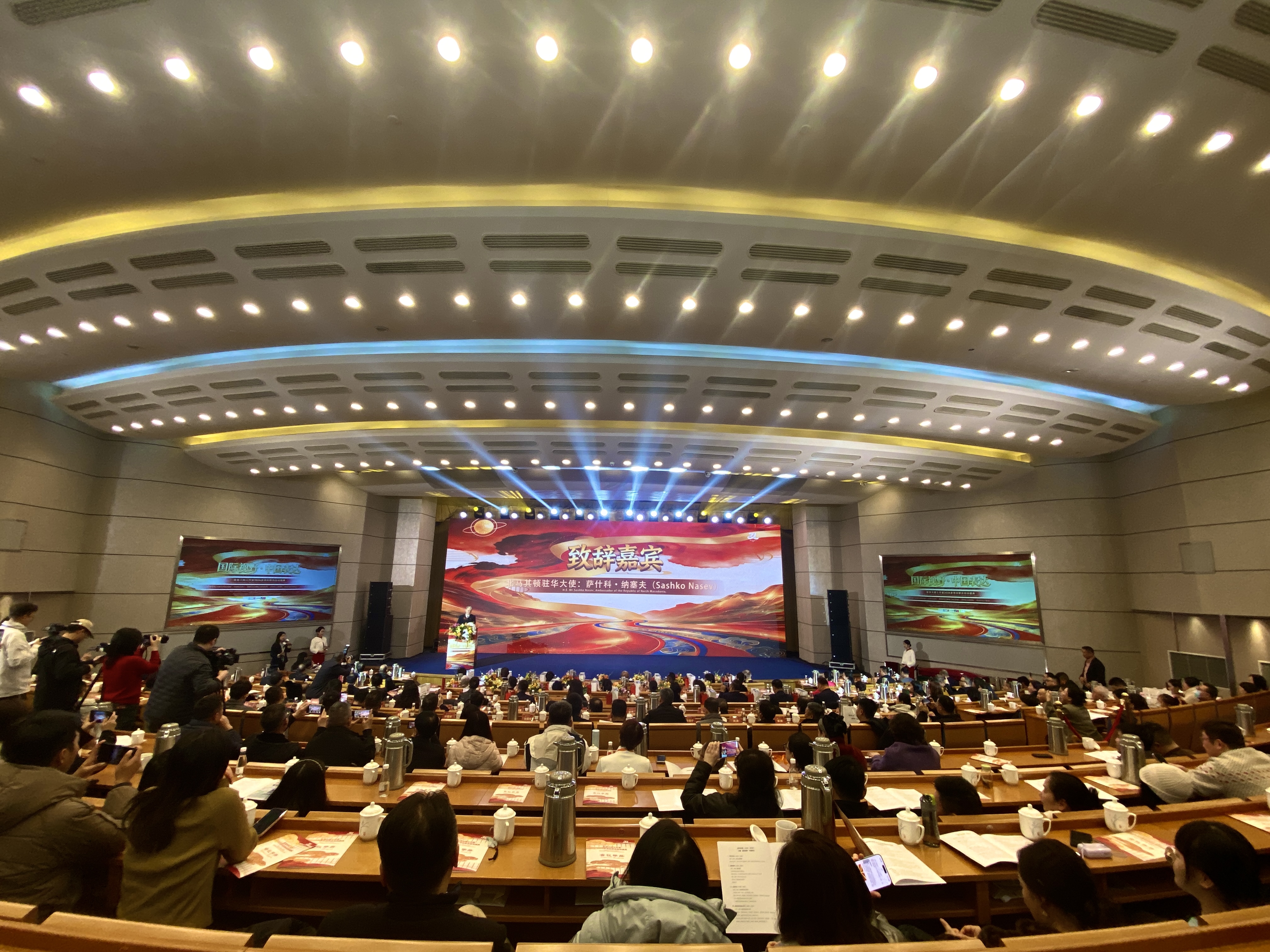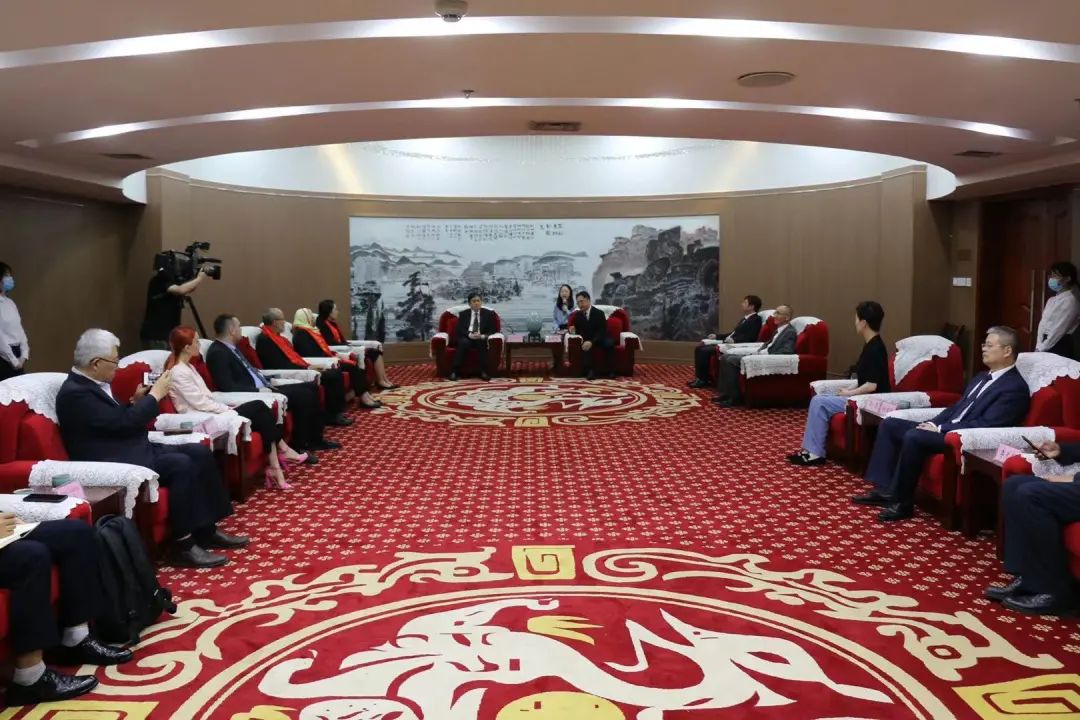Sergei Lavrov’s Recent Speech Points to Some Important Less
来源:
作者:James O’Neill* 点击:
发布时间:2021-06-15 15:44:02
2021年6月9日,俄罗斯外长谢尔盖•拉夫罗夫(Sergey Lavrov)在莫斯科的普里马科夫读书会(Primakov reading International Forum)上发表了讲话。拉夫罗夫表示,“我们的西方同事”不愿接受和平运动向多中心世界转变的“客观现实”。不出所料的是,西方媒体对此讲话关注很少。
相反,西方不惜一切代价维护自己在世界舞台上的特权地位。西方国家的代表们不准备基于事实来进行诚实的对话。这无疑破坏了人们对对话作为解决分歧方式这一理念的信任,也降低了外交作为对外政策基本工具的作用。
西方试图确立其观点的主要机制是不懈地推动其口中所说的“基于事实的世界秩序”。拉夫罗夫认为,这是一个“更加不合理且没有前景的概念”。
西方关于“以规则为基础的国际秩序”的概念是与《联合国宪章》形成对照的。《联合国宪章》本身也是一套规则,但已得到国际社会所有成员的普遍认可与协调,是国际法的基础。相比之下,西方使用“以规则为基础的国际秩序”这一表达,并通过对其的使用来传播完全不同的理念和思想。
“以规则为基础的国际秩序”这一理念在欧洲、美国和澳大利亚的使用尤为突出。
相比之下,俄罗斯正在欧亚大陆推广自己的理念。拉夫罗夫表示,俄罗斯所倡导的理念是一系列国际组织运作的基础,特别是在过去的十年中。这些组织包括独立国家联合体、集体安全条约组织、欧亚经济联盟和上海合作组织。
上述组织的特点都是完全基于“自愿参与、平等和共同利益”原则。加强与中国的全面协作无疑是俄罗斯的优先选项。今年是两国《中俄睦邻友好合作条约》签署20周年。
这是美国人非常想打破的关系。这无疑是美国总统拜登(Biden)迫切希望在不到一周的时间内与俄罗斯总统普京(Putin)在日内瓦进行会晤的主要动机之一。
基于拉夫罗夫所谓的“统一哲学”,俄罗斯正在不懈地追求以东盟为基础的政策。这一概念包括欧亚大陆的所有国家,拉夫罗夫将其视为能够大幅提高这一巨大地区所有国家相对优势的手段。上述组织说明了这一广大地区在经济和社会发展方面展开合作的国家数量。
对于有关即将与拜登进行会晤的问题,拉夫罗夫给予谨慎回应。他表示,会晤成功与否显然取决于美国人对这次会议的态度。同时,他表示,如果美国继续按照他们自己的宣传方式行事,那么对于这次峰会的期待将大大减少。
这是一个完全现实的观点。美俄关系在过去曾充满了许多问题。此次峰是否会给美俄关系带来现实的改善,是人们所普遍关注的问题。美国显然把中国视为其在世界地位的最大威胁,而割裂中俄关系是解决这一问题的方法之一。
在这一点及许多其他方面上,美国未能把握 21 世纪的地缘政治这一现实。美国正在拼命寻求将其与印度、日本、澳大利亚组成新联盟。邀请澳大利亚参加日前正在英国举行的七国峰会(G7)这一举措会使得澳大利亚自认为是印度太平洋地区关键角色,但对世界其他地区来说,这只是澳大利亚向美国屈服的又一个例子。
澳大利亚应把握地区性组织所提供的机会,因为这些组织是澳大利亚未来繁荣的关键。不幸的是,澳大利亚目前的外交政策方向并没有鼓励人们相信,澳大利亚已经了解了21世纪政治、经济和军事变革的现实。
The Russian foreign minister Sergey Lavrov recently made a very important speech that, unsurprisingly, received very little attention from the western media. On June 9 Mr Lavrov addressed the Primakov Readings International Forum in Moscow. In his speech, Lavrov drew attention to what he persists in calling “our western colleagues” unwillingness to accept the “objective reality” of a peaceful movement to a polycentric world.
Instead, the collective West strove to ensure the continuation of their “privileged international opinion” at all costs. The West’s unpreparedness for “an honest, facts-based dialogue” was certain to undermine trust in the very idea of dialogue as a method of settling differences “and to erode the capabilities of diplomacy as a crucial foreign policy tool”.
The main mechanism used by the West in trying to establish its point of view was in its relentless promotion of what it is pleased to call “the facts-based world order”. That is a concept, Lavrov argued, that was “even more irrational and devoid of prospects”.
The West’s concept of the rules-based world order was to be contrasted with the United Nations Charter, itself also a body of rules, but one that has been universally accepted and coordinated by all members of the international community. It is the latter that is the foundation of international law. The West, by contrast, uses the term the “rules-based world order,” by which they have in mind something completely different. The West, by its use of the rules-based world order have in mind a totally different concept.
These ideas of the rules based order are particularly marked in Europe, the United States and Australia.
By contrast, Russia is promoting its ideas in Eurasia. Lavrov drew attention to the fact that the values the Russians promote underlie the operation of a range of international organisations that have developed, especially over the past decade. These include the Commonwealth of Independent States, the Collective Security Treaty Organisation, the Eurasian Economic Union and the Shanghai Cooperation Organisation.
These organisations can all be characterised by being associations based exclusively on the principle of “voluntary participation, equality and the common good”. One of Russia’s priorities was the strengthening of the comprehensive interaction with China. This year marked the 20th anniversary of the Treaty of Good Neighbourliness and Friendly Cooperation between Russia and China.
That is a relationship the Americans would dearly love to break up. It is undoubtedly one of the principal motivations of United States president Biden’s anxious desire for a meeting with Vladimir Putin in Geneva in a little less than a week’s time.
The Russians are relentlessly pursuing an ASEAN based policy, based on what Lavrov called the “unification philosophy”. The concept embraces all of Eurasia’s nations, and Lavrov sees it as a means of dramatically increasing the comparative advantages of all the countries in this huge region. The aforementioned organisations are an illustration of how many countries in this vast region are cooperating in their economic and social development.
Lavrov was asked a question about the forthcoming meeting with Biden. He gave a cautious response. The success or otherwise of the mission would clearly depend upon the mindset the Americans brought to the meeting. Lavrov warned that if the Americans continued to follow the footsteps of their own propaganda, which deafens the United States elite as well, then there was “not much to expect from this summit”.
This is a totally realistic view. The history of United States – Russia relations has been fraught with many problems. It is difficult to escape the view that the latest summit will offer no realistic improvement in the United States – Russia relations. The Americans clearly see the Chinese as the greatest threat to their world position and one way to tackle the Chinese issue is to try to separate them from their relationship with Russia.
In this, is in so many other things, the Americans fail to grasp the geopolitical realities of the 21st-century. They are desperately seeking to cobble together a new alliance of India, Japan, Australia and themselves. Inviting Australia to the current G7 meeting in the United Kingdom surely flatters Australia’s perception of itself as a key player in the Indo Pacific region, but to the rest of the world it is merely yet another example of Australia’s obeisance to the United States.
Australia should grass the opportunities offered by the growing number of regional organisations mentioned above as providing the key to its future prosperity. Unfortunately, the current directions of its foreign policy do nothing to encourage the belief that Australia has grassed the realities of the 21st-century political, economic and military changes.
(责任编辑:James O’Neill*)
相反,西方不惜一切代价维护自己在世界舞台上的特权地位。西方国家的代表们不准备基于事实来进行诚实的对话。这无疑破坏了人们对对话作为解决分歧方式这一理念的信任,也降低了外交作为对外政策基本工具的作用。
西方试图确立其观点的主要机制是不懈地推动其口中所说的“基于事实的世界秩序”。拉夫罗夫认为,这是一个“更加不合理且没有前景的概念”。
西方关于“以规则为基础的国际秩序”的概念是与《联合国宪章》形成对照的。《联合国宪章》本身也是一套规则,但已得到国际社会所有成员的普遍认可与协调,是国际法的基础。相比之下,西方使用“以规则为基础的国际秩序”这一表达,并通过对其的使用来传播完全不同的理念和思想。
“以规则为基础的国际秩序”这一理念在欧洲、美国和澳大利亚的使用尤为突出。
相比之下,俄罗斯正在欧亚大陆推广自己的理念。拉夫罗夫表示,俄罗斯所倡导的理念是一系列国际组织运作的基础,特别是在过去的十年中。这些组织包括独立国家联合体、集体安全条约组织、欧亚经济联盟和上海合作组织。
上述组织的特点都是完全基于“自愿参与、平等和共同利益”原则。加强与中国的全面协作无疑是俄罗斯的优先选项。今年是两国《中俄睦邻友好合作条约》签署20周年。
这是美国人非常想打破的关系。这无疑是美国总统拜登(Biden)迫切希望在不到一周的时间内与俄罗斯总统普京(Putin)在日内瓦进行会晤的主要动机之一。
基于拉夫罗夫所谓的“统一哲学”,俄罗斯正在不懈地追求以东盟为基础的政策。这一概念包括欧亚大陆的所有国家,拉夫罗夫将其视为能够大幅提高这一巨大地区所有国家相对优势的手段。上述组织说明了这一广大地区在经济和社会发展方面展开合作的国家数量。
对于有关即将与拜登进行会晤的问题,拉夫罗夫给予谨慎回应。他表示,会晤成功与否显然取决于美国人对这次会议的态度。同时,他表示,如果美国继续按照他们自己的宣传方式行事,那么对于这次峰会的期待将大大减少。
这是一个完全现实的观点。美俄关系在过去曾充满了许多问题。此次峰是否会给美俄关系带来现实的改善,是人们所普遍关注的问题。美国显然把中国视为其在世界地位的最大威胁,而割裂中俄关系是解决这一问题的方法之一。
在这一点及许多其他方面上,美国未能把握 21 世纪的地缘政治这一现实。美国正在拼命寻求将其与印度、日本、澳大利亚组成新联盟。邀请澳大利亚参加日前正在英国举行的七国峰会(G7)这一举措会使得澳大利亚自认为是印度太平洋地区关键角色,但对世界其他地区来说,这只是澳大利亚向美国屈服的又一个例子。
澳大利亚应把握地区性组织所提供的机会,因为这些组织是澳大利亚未来繁荣的关键。不幸的是,澳大利亚目前的外交政策方向并没有鼓励人们相信,澳大利亚已经了解了21世纪政治、经济和军事变革的现实。
The Russian foreign minister Sergey Lavrov recently made a very important speech that, unsurprisingly, received very little attention from the western media. On June 9 Mr Lavrov addressed the Primakov Readings International Forum in Moscow. In his speech, Lavrov drew attention to what he persists in calling “our western colleagues” unwillingness to accept the “objective reality” of a peaceful movement to a polycentric world.
Instead, the collective West strove to ensure the continuation of their “privileged international opinion” at all costs. The West’s unpreparedness for “an honest, facts-based dialogue” was certain to undermine trust in the very idea of dialogue as a method of settling differences “and to erode the capabilities of diplomacy as a crucial foreign policy tool”.
The main mechanism used by the West in trying to establish its point of view was in its relentless promotion of what it is pleased to call “the facts-based world order”. That is a concept, Lavrov argued, that was “even more irrational and devoid of prospects”.
The West’s concept of the rules-based world order was to be contrasted with the United Nations Charter, itself also a body of rules, but one that has been universally accepted and coordinated by all members of the international community. It is the latter that is the foundation of international law. The West, by contrast, uses the term the “rules-based world order,” by which they have in mind something completely different. The West, by its use of the rules-based world order have in mind a totally different concept.
These ideas of the rules based order are particularly marked in Europe, the United States and Australia.
By contrast, Russia is promoting its ideas in Eurasia. Lavrov drew attention to the fact that the values the Russians promote underlie the operation of a range of international organisations that have developed, especially over the past decade. These include the Commonwealth of Independent States, the Collective Security Treaty Organisation, the Eurasian Economic Union and the Shanghai Cooperation Organisation.
These organisations can all be characterised by being associations based exclusively on the principle of “voluntary participation, equality and the common good”. One of Russia’s priorities was the strengthening of the comprehensive interaction with China. This year marked the 20th anniversary of the Treaty of Good Neighbourliness and Friendly Cooperation between Russia and China.
That is a relationship the Americans would dearly love to break up. It is undoubtedly one of the principal motivations of United States president Biden’s anxious desire for a meeting with Vladimir Putin in Geneva in a little less than a week’s time.
The Russians are relentlessly pursuing an ASEAN based policy, based on what Lavrov called the “unification philosophy”. The concept embraces all of Eurasia’s nations, and Lavrov sees it as a means of dramatically increasing the comparative advantages of all the countries in this huge region. The aforementioned organisations are an illustration of how many countries in this vast region are cooperating in their economic and social development.
Lavrov was asked a question about the forthcoming meeting with Biden. He gave a cautious response. The success or otherwise of the mission would clearly depend upon the mindset the Americans brought to the meeting. Lavrov warned that if the Americans continued to follow the footsteps of their own propaganda, which deafens the United States elite as well, then there was “not much to expect from this summit”.
This is a totally realistic view. The history of United States – Russia relations has been fraught with many problems. It is difficult to escape the view that the latest summit will offer no realistic improvement in the United States – Russia relations. The Americans clearly see the Chinese as the greatest threat to their world position and one way to tackle the Chinese issue is to try to separate them from their relationship with Russia.
In this, is in so many other things, the Americans fail to grasp the geopolitical realities of the 21st-century. They are desperately seeking to cobble together a new alliance of India, Japan, Australia and themselves. Inviting Australia to the current G7 meeting in the United Kingdom surely flatters Australia’s perception of itself as a key player in the Indo Pacific region, but to the rest of the world it is merely yet another example of Australia’s obeisance to the United States.
Australia should grass the opportunities offered by the growing number of regional organisations mentioned above as providing the key to its future prosperity. Unfortunately, the current directions of its foreign policy do nothing to encourage the belief that Australia has grassed the realities of the 21st-century political, economic and military changes.
版权及免责声明
1、本网转载媒体稿件旨在传播更多有益信息,并不代表同意该观点,本网不承担稿件侵权行为的连带责任;
2、在本网博客/论坛发表言论者,文责自负。
推荐文章
热点内容
-
 张录工作室2026多项目联合计划
中国国际教育电视台讯:1月31日,“张录大师工作室2026多项目联合启动盛典”在浙江省人民大会堂国际会议厅隆重举行。本次活动由中国国际教育电视台、张录大师工作室
张录工作室2026多项目联合计划
中国国际教育电视台讯:1月31日,“张录大师工作室2026多项目联合启动盛典”在浙江省人民大会堂国际会议厅隆重举行。本次活动由中国国际教育电视台、张录大师工作室
-
 CECTV《声起东方》全球中文经
制片主任:李敏
CECTV《声起东方》全球中文经
制片主任:李敏
- ・《少林点穴的隐秘力量》纪录片在郑州圆满杀青
- ・2025GT世界挑战赛北京亦庄站启幕
- ・北京市侨联召开海外北京会座谈交流会
- ・2025GT世界挑战赛北京亦庄站圆满落幕
- ・短片【未封存的岁月日记】的时代意义
- ・侨智未来·创新人才发展活动举办
- ・2025GT世界挑战赛北京亦庄站筹备进入冲刺阶段
- ・无锡味道 世界共享LA LISTE 2025全球美食
- ・2025“校园星主播”国际展演(韩国站)圆满结束
- ・“勇气少年团”综艺节目开始选拨啦
- ・CECTV《声起东方》全球中文经典朗读节目
- ・美国迈阿密大学访问学者项目
- ・2012第二届中国国际积极心理学大会
- ・首届世界香具文化大会暨高峰论坛在浙江龙泉圆满召开
最新文章
- ・张录工作室2026多项目联合计划在杭启幕 构建文化出
- ・AI漫剧人才评价标准研讨会在京举行
- ・百集电视访谈栏目《健康大讲堂》----磷虾油与健康第
- ・百集电视访谈栏目《健康大讲堂》----特医食品与健康
- ・“汇聚力量·点燃希望”大手牵小手“我和星宝过大年”暨
- ・古巴民族英雄何塞·马蒂诞辰173周年暨菲德尔·卡斯特
- ・以象为维 医艺新章
- ・百集电视访谈栏目《健康大讲堂》----特医食品与健康
- ・百集电视访谈栏目《健康大讲堂》----维生素k2与健
- ・首次披露“七个一”工程,民营经济高质量发展丰台大会召
- ・CECTV《声起东方》全球中文经典朗读节目
- ・“勇气少年团”综艺节目开始选拨啦
- ・2025“校园星主播”国际展演(韩国站)圆满结束
- ・首届世界香具文化大会暨高峰论坛在浙江龙泉圆满召开
- ・2012第二届中国国际积极心理学大会
- ・美国迈阿密大学访问学者项目








